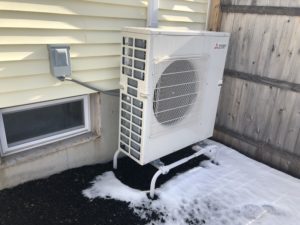Who is a member?
Our members are the local governments of Massachusetts and their elected and appointed leadership.

Net-zero energy codes encourage the use of electric heat pumps rather than burning fossil fuels.
The Department of Energy Resources is accepting public comment on proposed changes to the state building code that would help the state achieve its goal of net-zero emissions by 2050.
The DOER is proposing updates to the state’s base energy code and “stretch energy” code, as well as the introduction of a new, net-zero energy code that municipalities could opt into. The proposed changes to the building codes are in the form of a “straw proposal” that was unveiled on Feb. 8. Following public comments, the DOER will draft specific code language, expected to be released this summer, and then hold regulatory hearings.
The DOER said it conducted research to find the lowest-cost path to decarbonizing buildings, and its analysis looked at 12 different types of buildings and their specific needs.
In 2009, Massachusetts became the first state to adopt an above-code appendix to the base building energy code. This “stretch code” is designed to result in cost-effective construction that is more energy efficient than that built under the base code. The stretch code was last updated in 2017.
Since 2010, municipalities have had two building code options: the state’s base energy code or the stretch energy code created by the Green Communities Act of 2008. Adoption of the stretch code is a requirement for becoming a Green Community, a designation achieved by 299 cities and towns thus far.
Last year’s omnibus climate law requires the state to create a new opt-in net-zero stretch energy code for municipalities by the end of 2022. The goal of a net-zero energy code is to transition away from heating buildings with fossil fuels and move to electrified systems such as heat pumps.
Residential and commercial buildings were responsible for 27% of the greenhouse gas emissions in Massachusetts as of 2017, the latest year with official emissions data, according to a December 2020 report from the Executive Office of Energy and Environmental Affairs.
Municipalities will not be required to adopt the new net-zero stretch energy code once it is finalized. Any city or town will be able to continue using either the base energy code or the regular stretch energy code.
The DOER has scheduled a series of five hearings in early March to discuss the draft prior to the public comment deadline. The hearing schedule, and more information about the new net-zero stretch energy code, is available on the DOER website.
Public comments on the straw proposal are due by 5 p.m. on Friday, March 18. Comments can be sent to [email protected] with the subject line “Stretch Code Straw Proposal Comments.”